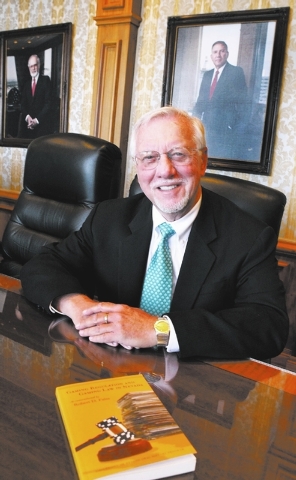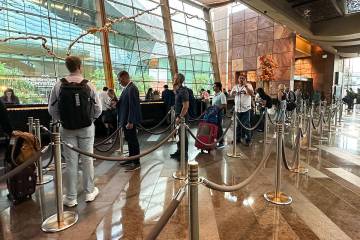As gaming unfolded, Faiss was there
Bob Faiss is considered one of the world’s leading gaming attorneys. His 40-year career could serve as a documentary on the history of Nevada gaming law and the expansion of the casino industry.
Yet, Faiss nearly took a pass on law school.
Thankfully, his friend and mentor, former Nevada Gov. Grant Sawyer, intervened.
“I guess, like many other things in my career, Grant Sawyer was responsible,” Faiss, 79, said this past week.
Sitting in a 17th floor conference room at Lionel Sawyer &Collins — the statewide law firm commands the top three floors of the downtown Las Vegas Bank of America tower — Faiss reflected on a career that found him firmly in the middle of most events that have shaped the gaming industry since the 1960s.
During September’s Global Gaming Expo in Las Vegas, Faiss was honored at a luncheon of the International Association of Gaming Advisors for his “extensive contributions to gaming law.”
Nevada Gaming Commission Chairman Peter Bernhard, in introducing Faiss to the luncheon audience, painted a portrait of the attorney that could be compared to a real life Leonard Zelig, the fictional Woody Allen character who found himself a part of many 20th century historical events.
Unlike the movie character, however, Bernhard told the luncheon crowd, “Bob was there.”
Faiss was key to corporate America’s expansion into gaming; the approval of private gaming salons in Strip resorts; business growth by Nevada-based gaming companies across the U.S. and into foreign markets; and the recent efforts to legalize Internet gaming and mobile wagering.
Faiss was awestruck by the event. He choked up during several prolonged standing ovations. And, as he has done so many times before, Faiss turned the attention away from himself. His accomplishments, he said, were because of the clients he’s represented on behalf of the law firm and other attorneys he’s been privileged to work with.
“Any awards should be shared by all of you,” Faiss told the audience. “You were there, too.”
The reception was overwhelming for Faiss, who has spent the past year battling cancer. He has returned to the law firm on a limited basis, but said he’s “getting stronger every day.” While admitting “it’s been a rough year,” the support “of so many people has been humbling.”
As chairman of the firm’s gaming and regulatory law department, Faiss’ client list reads like an historical record. He represented the Del Webb Corp., one of Nevada’s largest casino operators in the 1970s. In 1985, he helped Hilton Hotels Corp. earn a gaming license in Australia, becoming the first Nevada licensee to operate outside the United States. Faiss was lead counsel for the Summa Corp., the company that operated casinos owned by reclusive billionaire Howard Hughes during the 1980s. He has represented such gaming luminaries as Burton Cohen and Kirk Kerkorian.
“It’s the quality of clients that provided me the opportunity to be involved with all the changes in gaming law,” Faiss said.
His legal career almost didn’t happen.
Faiss spent 1968 serving as a White House staff assistant to President Lyndon Johnson. A year later, he had a good federal government job and was weighing entering American University School of Law in Washington, D.C., attending classes at night part time while working days. He would have been in his early 40s when he graduated.
“I had a talk with myself,” Faiss recalled. “Why would I want to do that?”
A round of golf with Sawyer changed his mind. The former governor, who was then Nevada’s only gaming lawyer, was in Washington on business. Faiss was Sawyer’s chief executive assistant from 1963 to 1967.
They were walking off the 18th green and Sawyer asked “how that law school thing was going.” When Faiss said he dismissed the idea, Sawyer expressed disappointment. He said he was hoping Faiss would return to Nevada and join him at the law firm.
“I said, ‘OK, I’ll go to law school,” Faiss recalled. He graduated in 1972.
As Sawyer’s assistant in the governor’s office, Faiss was instrumental in implementing monumental changes in how gaming was regulated in Nevada. The basic structure of Sawyer’s regulatory program remains in place today.
In the 1960s, Nevada’s legalized gaming industry was frowned upon by the federal government. Years later, other states and countries use Nevada’s structure as a blueprint, which pleases Faiss.
“They don’t necessarily copy us,” Faiss said. “A little part of Nevada is in every new gaming control system.”
Sawyer was a lasting influence on Faiss’ life and career. In his eulogy for Sawyer in 1996, Faiss opened with the line, “The best man I ever knew died this week.”
Faiss has never spoken much about his time with President Johnson. Faiss is considered to be the first Nevadan to ever hold a commissioned White House position. Last week, Faiss said Johnson was “the perfect president for the country” following the assassination of President John F. Kennedy.
“He could be the kindest, most thoughtful and understanding person, and he could also be the most miserable person,” Faiss said of Johnson. “He was a wide range of emotions. But he was so experienced and he had the courage to do everything. He got President Kennedy’s civil rights program passed. It was his force and context that did that.”
Faiss’ oral history book, “Gaming Regulation and Gaming Law in Nevada,” was unveiled in 2009 on the 50th anniversary of the Nevada Gaming Commission and the 10th birthday of the Boyd School of Law at UNLV. Faiss was instrumental in creating a course on gaming law for the school.
“(Las Vegas) is the greatest laboratory in the world for gaming,” said Faiss, whose book has even been translated into Japanese.
Faiss made his first appearance in several months in front of state gaming regulators this past week, and again, his client had a historical perspective. The licensing request is to return gaming in the form of 15 slot machines to the historic Mizpah Hotel in Tonopah for the first time since April 2000.
Howard Stutz’s Inside Gaming column appears Sundays. He can be reached at hstutz@reviewjournal.com or 702-477-3871. Follow @howardstutz on Twitter.






















